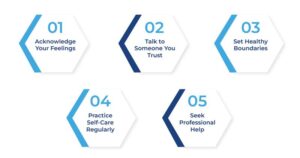High functioning depression tends to be hidden from others, and sometimes, it is missed by those struggling with it. Major depression can make it hard for a person to function, but individuals with high-functioning depression may remain active at home and work. The appearance may be normal, but on the inside, there is an ongoing fight against depression, tiredness, and burnout.
Similarly, if your emotions are difficult to handle, even though you’re doing well on the outside, it’s good to ask for help. You can see a doctor before you experience any breakdown. It is possible to receive effective treatment for high-functioning depression. Read on and learn more about the signs, causes, and treatment options as well!
What Is High Functioning Depression?
Though high-functioning depression looks good on the surface, someone suffering from it still experiences extreme sadness, emptiness, or hopelessness inside. Apart from some symptoms, depression like this can be hard to detect since the person conceals their feelings.
In addition, those with high-functioning depression try to do everything themselves; it is more difficult for them to seek help. They might think that they shouldn’t be unhappy if all seems well to everyone else. Thus, you should realize that their symptoms are real and that the medication can help them improve with time.
High Functioning Depression Symptoms
Here are some usual signs of high functioning depression:
- Feeling sad or down all the time
- Not having much energy during most days
- Losing interest in the things they once cared about
- Problems with focus and decision-making
- Spending more or less time than you should in bed
- Having an appetite that is off (too much or too little)
- Experiencing a lack of emotion or emotionless feelings
- Fading away quietly in close relationships
High Functioning Depression and Anxiety
The person with high-functioning depression or anxiety looks composed to outsiders internally when they are dealing with anxiety or depression. Someone experiencing high-functioning depression might feel tired, unhappy, and sad, but they can keep up with the demands of their work. Most of the time, they push their hurt aside and behave as if nothing has happened. Thus, it’s typically hard for anyone to notice that there is a problem.
Furthermore, individuals are often dealing with a lot of stress, fear, or fearful thoughts. At certain moments, they become stuck on their worries, steer clear of things that frighten them, or become tense much of the time. Even when their answer is fine, they are often spent dealing with life. Thus, they are still successful, but many people overlook or misunderstand the problems they face.
How To Deal with High Functioning Depression

1. Acknowledge Your Feelings
Recognizing that your depression is real and is affecting you is the first thing to do. It doesn’t matter how you seem; your emotions are still important. Later on, ignoring your feelings may cause even greater problems. Don’t feel bad or ashamed about your feelings. Giving yourself free to feel what you feel allows you to heal.
2. Talk to Someone You Trust
If you have a hard time, sharing how you feel with someone you trust can help you relax. It makes you feel like you’re not going through your struggles by yourself. It doesn’t matter if you articulate every little detail correctly; hearing your feelings is all that’s necessary. Expressing your feelings through conversation may ease your mind and make you feel understood. Support for your feelings is needed, even if you’re able to manage well on your own.
3. Set Healthy Boundaries
You have the right to say no when it’s needed for your mental health. Individuals who can function well often try to do everything enough to meet other people’s demands. Prioritize cutting down your commitments if they make you feel worse. Put yourself first and feel no shame about it. Boundaries give you time to take a break and recharge.
4. Practice Self-Care Regularly
Schedule little activities every day that bring you relaxation or joy, for example, walking, writing in a journal, or listening to music. Looking after yourself can bring down your stress and lift your mood in the future. You might not think you have enough time, yet anything you can do is valuable. Be as nice to yourself as you are to others. Sticking with a routine gives your body the best chance to feel better.
5. Seek Professional Help
Working with a mental health professional allows you to discover your depression and try out methods to manage it. If you work with a therapist and/or take medication, you can experience significant improvement. If things start to feel bad, seek assistance sooner, as it typically works better than waiting. People working professionally are skilled in helping people just like you. Calling for help is a smart thing to do when you need support.
Process of High Functioning Depression Test
A high-functioning depression test generally begins when a mental health professional asks you about your emotions, energy, sleep, and daily lifestyle. You might be asked how much time you’ve been feeling low or stressed and whether it interferes with your life at home or your work. Because people with high-functioning depression often keep their symptoms private, the test looks at how they feel on the inside, not just at their behavioral. If you give honest responses, people can learn more accurately.
Moreover, the exam may involve answering questions written on paper or through a verbal discussion during treatment. The idea is to spot continuing sadness, boredom with daily activities, and emotional blurriness despite your regular performance. The professional may seek information on any prior mental health problems and the family’s mental health history. Hence, your responses will allow them to figure out if you’re dealing with high-functioning depression and provide the right support or treatment.
High Functioning Depression Treatment
1. Psychiatric Evaluation
The initial process in handling high-functioning depression is making a psychiatric diagnosis. You will speak with the professional about your thoughts, feelings, behavior, and what you’ve gone through in the past. They use this to gain a clear picture of your illness and detect other mental illnesses you might have. The results of the evaluation guide your next set of treatment options.
2. Medication Management
A psychiatrist can suggest medicine to treat mood swings by helping the brain’s chemicals work better. Antidepressants are commonly given to help lower sadness, worry, and tiredness. If required, the doctor will adjust the medicine’s dose based on the results from monitoring you. Taking your medication exactly as instructed and talking about any adverse effects is very important. Often, therapy and adjusting your lifestyle help medication work its best.
3. Lifestyle Changes
Maintaining healthy habits can help a lot with managing high-functioning depression. Taking care of yourself means exercising, eating well, getting enough sleep, and keeping stress levels down. Practicing mindfulness and doing things that you enjoy can help you, too. Little steps your way can eventually help your mental health. If you stick to an everyday routine and choose your own goals, you will likely keep your motivation.
End Note
Individuals with high-functioning depression manage regular duties, but they still feel sad, have little energy, and lose interest. We recognize the difficulties that usually remain unknown with this condition and provide personalized treatment using medications. Our team of psychiatrists looks into your symptoms carefully and prescribes medicines to help improve your mood.
Lastly, we aim to keep an eye on things and help you so your depressive symptoms decline and your overall well-being improves. At MAVA Behavioral Health, we focus on compassion that meets your needs so you can quickly feel better and maintain your daily life.
FAQs
What is high-functioning depression?
High-functioning depression is a form of depression where a person appears to manage daily tasks like work, school, or relationships but internally struggles with sadness, fatigue, low self-worth, and emotional numbness. It’s often hidden behind a smile or a productive lifestyle.
How is it different from major depression?
Unlike major depression, where symptoms can be intense and visibly disruptive, high-functioning depression allows individuals to continue functioning in daily life. However, the emotional distress is still significant and can worsen if left untreated.
What are the common symptoms?
Symptoms include constant low mood, lack of interest in enjoyable activities, low energy, irritability, sleep issues, self-doubt, and feeling emotionally disconnected—all while maintaining a normal outward routine.
Can high-functioning depression go away on its own?
Symptoms can improve temporarily, but without proper treatment, high-functioning depression often persists or worsens over time. Professional help is important for long-term improvement.









